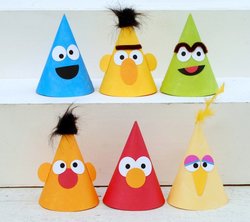Hat Party!
 Suppose you and 5 of your friends each brought a hat to a party. The hats are then put into a large box for a random-hat-draw. What is the probability that nobody selects his or her own hat?
Suppose you and 5 of your friends each brought a hat to a party. The hats are then put into a large box for a random-hat-draw. What is the probability that nobody selects his or her own hat?
The answer is 0.368.
This section requires Javascript.
You are seeing this because something didn't load right. We suggest you, (a) try
refreshing the page, (b) enabling javascript if it is disabled on your browser and,
finally, (c)
loading the
non-javascript version of this page
. We're sorry about the hassle.
4 solutions
Sorry for being picky, but I just have a minor correction to suggest. Since we are actually dealing with 6 items there would be 2 6 5 derangements out of a total of 6 ! = 7 2 0 possible distributions of the hats. So the probability would then be p = 7 2 0 2 6 5 , which does comes out to 0 . 3 6 8 to 3 decimal places, ( 1 2 0 4 4 = 0 . 3 6 7 to 3 decimal places).
Log in to reply
Not picky! You are right! Actually if you round p 5 properly, you going to find the same result. I've already fixed it! Thank you!
Yeah, this is actually a classic problem (albeit a cool one). The limit as n approaches infinity is 1/e.
I am unable to understand the logic behind the formula you used to find the number of possibilities that nobody gets their own hat. Can you please explain further? Thanks.
Why isn't this a normal probability problem of the form: The first person has a chance of not picking his hat of 5/6, the second of 4/5 and so on..
5/6 * 4/5 * 3*4 * 2/3 * 1/2 = 0.166666
Why is this thinking wrong?
Log in to reply
For example, if the first person picks the second personʻs hat, then the second person has a 5/5 chance to not pick their own hat, because the first person already picked it. And if the second person picks the third personʻs hat as well, the same thing happens.
This classic problem by Henry Ernest Dudeney has an interesting pattern which bears a mention. The successive solutions for any number of persons from one to eight ---
1= 0
2= 1
3= 2
4= 9
5= 44
6 = 265
7 = 1854
8= 14833
To get these numbers, multiply successively by 2, 3, 4, 5, etc.
When the multiplier is even, add 1; when odd, deduct 1. Thus, 3 × 1 - 1 = 2, 4 × 2 + 1 = 9; 5 × 9 - 1 = 44; and so on.
Or one can multiply the sum of the number of ways for n-1 and n-2 persons by n-1, and so get the solution for n persons.
Thus, 4(2 + 9) = 44; 5(9 + 44) = 265; and so on.
Formula for Derangement of n objects is [n!/e] where [.] nearest integer. which is [720/2.7182818284590452353602874713527] = 265. Total possibilities of selecting hats by 6 people is 720. therefore 265/720 = 0.368
For this problem, use derangement.
d(n) = (n-1) [d(n-1) + d(n-2)]
with base case d(1) = 0 and d(2) = 1, we get d(6) = 5 x 53 = 165
so P = 165/ 6! = 0.368
The total of possibilities that each person can get their hat is P 6 = 6 ! = 7 2 0 and the total of possibilities that nobody selects their own hat is: D 6 = 6 ! k = 0 ∑ 6 k ! ( − 1 ) k = 2 6 5 , so the probability of each person get their wrong hat is: p = 7 2 0 2 6 5 ≈ 0 . 3 6 8 . An easier way of calculating D n , if you are allowed to use a calculator, is using the relation: D n = [ e n ! ] , then: D 6 = [ e 6 ! ] = [ 2 6 4 . 8 7 3 2 ] = 2 6 5 .